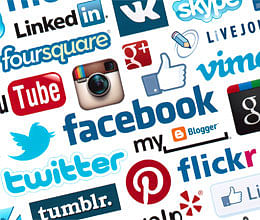
When an interior designer tried to connect to potential customers via LinkedIn for his after work hours business, he got a termination letter from his original job in return.
Bradford Pedley was fired by Canberra design firm peckvonhartel, hours after hearing about the LinkedIn email, which pledged to expand his fledgling business 'to a full-time design practice', the Sydney Morning Herald reports.
Fair Work Commission adjourned the case saying it was well within the rights of the firm to fire him thereby highlighting the consequences which social media can have to an individual's professional life.
Canberra firm's special counsel on workplace relations, Michael Byrnes, said that Pedley's sacking 'illustrates the potential pitfalls of an employee pursuing out-of-work activities that are incompatible with his or her duties to an employer'.
Byrnes added that although LinkedIn content was generally 'less scandal-prone' than Facebook or Twitter, the blending of the personal and professional on LinkedIn makes it just as dangerous adding that on Twitter and Facebook, one can generally make a clear demarcation between their private and professional sphere.
Lawyer Carita Kazakoff, at labour law firm Slater and Gordon said that many users of Twitter, Facebook or Instagram often had the type of conversation one might have in the pub with their mates and counseled employees to maximise the privacy settings on social media sites and apps and delete any inappropriate behaviour, the report added.
Bradford Pedley was fired by Canberra design firm peckvonhartel, hours after hearing about the LinkedIn email, which pledged to expand his fledgling business 'to a full-time design practice', the Sydney Morning Herald reports.
Fair Work Commission adjourned the case saying it was well within the rights of the firm to fire him thereby highlighting the consequences which social media can have to an individual's professional life.
Canberra firm's special counsel on workplace relations, Michael Byrnes, said that Pedley's sacking 'illustrates the potential pitfalls of an employee pursuing out-of-work activities that are incompatible with his or her duties to an employer'.
Byrnes added that although LinkedIn content was generally 'less scandal-prone' than Facebook or Twitter, the blending of the personal and professional on LinkedIn makes it just as dangerous adding that on Twitter and Facebook, one can generally make a clear demarcation between their private and professional sphere.
Lawyer Carita Kazakoff, at labour law firm Slater and Gordon said that many users of Twitter, Facebook or Instagram often had the type of conversation one might have in the pub with their mates and counseled employees to maximise the privacy settings on social media sites and apps and delete any inappropriate behaviour, the report added.










